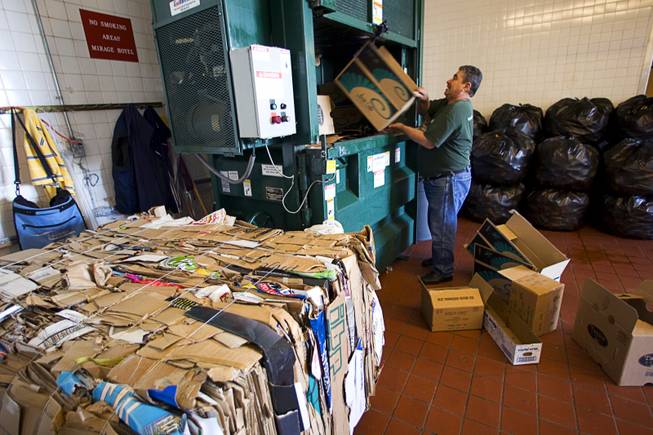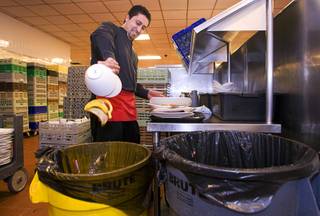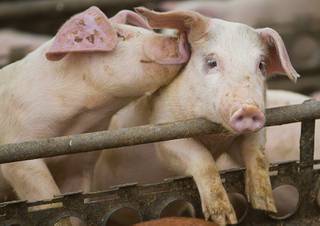
Waste Management employee Ismael Guerrero loads cardboard into a baler at a Mirage loading dock Monday, April 12, 2011. MGM properties recycled 18,600 bales of cardboard in 2010. Each bale weighs about 900 lbs.
Sunday, May 22, 2011 | 1:55 a.m.
Sun archives
- Convenience, affordability at odds in county recycling debate (12-7-2010)
- Trash, recycling proposal divides county commission (10-5-2010)
- Commissioner forces issue on recycling ‘pilot programs’ (10-3-2010)
- Republic’s purchase of Evergreen could bring recycling boost (7-20-2010)
- Republic Services, Evergreen Recycling announce merger (7-13-2010)
- New EcoCentre recycling complex could help planet and economy (4-29-2010)
- Convention Center’s recycling rate among nation’s best (3-10-2010)
- Valley apartments go green with recycling (12-7-2009)
- VA hospital project quantifies recycling effort (11-27-2009)
The 7,600 tons of excess food sent every year from MGM Resorts International restaurants and buffets to Bob Combs’ pig farm in North Las Vegas may be the messiest example of responsible recycling along the Strip, but it’s certainly not the least.
“Recycling is the best-kept secret on the Las Vegas Strip,” says Brad Tomm, sustainability manager for MGM Resorts, which recycled a third of its garbage in 2010. The corporation’s newest development, CityCenter, recycles more than half of its garbage.
Much of the recycling, thankfully, occurs beyond the eyes of resort guests. Crews employed by Combs sort through tons of garbage — typically on conveyor belts or in huge troughs — even before the stuff is trucked off the property. That’s a deal Combs struck with MGM Resorts: If his pigs could get all the leftover food, his people would comb through the garbage at the hotels and recover stuff thrown away by guests — glasses, dishes, silverware, coffee mugs and the like. It’s called asset recovery.
While his people are poking through the garbage, they pull out plastic, glass, aluminum and cardboard that they can cart off to the recycling redemption businesses, and pull out food that might have ended up in the garbage stream versus the left-over-food stream.
In 2007, MGM Resorts recycled about 10 percent of all material. To improve the results, Tomm established recycling coordinators at each property and began preaching the recycling message throughout the company’s properties, giving shout-outs to the most conscientious vendors and to foster competition among company employees.
(The rivalry helped generate, for example, a cork-recycling program. All bartenders, from bars to pools, now save used corks and send them to Napa-based ReCork America, where they get recycled and used in flip-flops, shoes and other usable items.)
At New York-New York, 13.6 tons of waste is generated daily, 4 million of which passes by David Benitez, standing on a back dock, clipboard in hand.” He’s on the lookout for the kind of garbage that should never be thrown away by hotel staff to begin with, but rather be put in recycle bins — plastic bottles, aluminum cans, those sorts of items.
“That’s our focus,” Tomm says. “What can we control?”
To that end, Tomm is looking at absolutely everything in the properties, but the primary focus is put on kitchens, the biggest waste producers in the casino environment.
Employee education is a key component as well. Tomm says he wants all of MGM Resorts’ 60,000 employees to recycle at home as well as at work, and launched a “Conservation Begins at Home” program. “We’ll have green fairs and bring in our vendors to educate everyone about recycling at home, so they can sign up there for Republic Services’ curbside recycling program.” At a recent fair, NV Energy distributed 120,000 energy-saving light bulbs to employees. “We noticed differences in enthusiasm very quickly” after launching the program, Tomm says.
A couple of feet from Benitez, two men are reaching in to a huge trough that feeds into an enormous compactor, looking for anything that can be recycled.
With the height of the trough nearly equaling their own, the men are literally face-to-face with the nastiest kinds of leaking, oozing waste imaginable — used diapers, spoiled food. Tomm, who’s spent time at that trough himself, calls the dock workers “the hardest-working people on the Strip, without a doubt.”
All MGM Resorts properties have transformed their trash docks into recycling docks, and what started as a partnership with R.C. Farms has grown into a multitiered operation, with many other vendors in the mix. For example, at New York-New York, Republic Services reclaims glass, A-1 Organic collects food for composting and NVCCU takes care of the mixed product. “The old model was one vendor does all. We’re now using vendors based on their strengths. This business is more competitive than ever.”
Tomm sees CityCenter as the future for Strip recycling. It was built with green in mind, operating recycling docks that function with the utmost efficiency and achieving gold LEED certification for six of its buildings.
Cardboard bales the size of small cars sit on one dock, ready to be shipped out. Altogether, Tomm says, CityCenter recycles 6.6 tons of cardboard a day. A trough near the center of the room holds future pig food, and the asset recovery area is jammed to capacity with salt shakers, wine buckets, ashtrays, tea glasses, pitchers and ice buckets. A wide, deep box in one corner is for discarded corks; it’s almost full. Tomm points to a group of “grease caddies,” which act as vacuum cleaners for the properties’ deep-fat fryers. Then he points down. “You’re standing on top of the tank we use to store that grease. We’re doing 2,000 pounds a day.”
The big question at this point is how much further Strip properties can go.
The logical next step would seem to be placing recycling bins on the casino floor, but Tomm says that’s a very difficult environment to control. “If that’s what the customers want, we’ll do that. But if they aren’t interested in participating, it only causes more work for us. Say you have a bag for cans — throw one hamburger in there and the whole bag is worthless.”
Once a convention is concluded, much of the leftovers are given to local schools — pens, papers, pads, bags, etc. Caesars Entertainment has a similar program, called Teacher’s Exchange, as well as its own cork-recycling program and “Clean the World,” in which its leftover soaps and shampoos are donated to developing countries.
When MGM Resorts was constructing CityCenter, waste got recycled and reused.
And a roster of interesting uses have sprung up around hotel paraphernalia. Room keys are ground up and used in playground material; old towels and linens are sent to animal shelters; and tons of glass are taken from Mandalay Bay to Henderson-based Realm of Design for use in its material made of 99.9 percent glass.
It’s an evolving process that continues to inspire Tomm, who worked on oil rigs as a petroleum engineer in California before he came to Las Vegas.
“I went from the dirtiest work in the world to the cleanest work in the world,” he says. “Recycling has become my most passionate project. I have a truly green job, and I’m fortunate in that I can inspire others to join us and make a difference.”
RECYCLING BY THE NUMBERS
- 72,000 homes in Republic’s pilot recycling program
- 1.8 pounds per week residents recycle using the red, white and blue crates
- 14-16 pounds per week residents recycle using the pilot program’s 96-gallon bin
- 4,200 tons per month Republic Services recycles curbside for the entire Las Vegas Valley
- 2,200 tons Republic recycles from just five Strip properties in the same time period (does not represent the full total recycled from those properties, as several other vendors are also involved)
- 340 tons of plastic recycled every year
- 91 tons of aluminum recycled every year
- 2,250 tons of glass recycled every year
- 640,000 gallons of restaurant oil recycled every year by Caesars Entertainment’s Strip properties worldwide (123,000 gallons on the Strip)
- 47,000 magazines recycled
- 8,722 tons of food waste recycled every year
- 8,403 tons of corrugated cardboard recycled every year
- 55.2% amount CityCenter recycled in 2010
- 14.3% amount Circus Circus recycled in 2010
For Republic Services
For Caesars Entertainment
For MGM Resorts
A version of this story originally appeared in Las Vegas Weekly.
CORRECTION: A reference to 13.6 million tons of waste being generated daily was changed to the correct number, 13.6 tons. | (May 22, 2011)



Join the Discussion:
Check this out for a full explanation of our conversion to the LiveFyre commenting system and instructions on how to sign up for an account.
Full comments policy